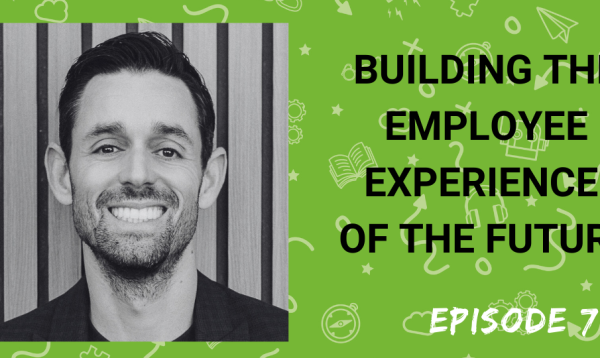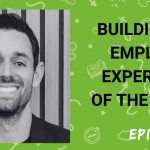It is always important to step back and see the world through a different lens. With that in mind, I’ll be talking to several people on the show this year who have a vested interest in recruiting but aren’t viewing it from inside the industry bubble.
My guest on this week’s show is Charlie O’Donnell founder and partner at Brooklyn Bridge Ventures in New York. Charlie is an early stage investor in a number of fast growing start-up companies and has first-hand experience of seeing which recruiting strategies are working in these dynamic business environments.
In the interview we discuss:
• The importance of effective team building
• The challenges of defining and hiring to cultural fit
• An “A Player” culture versus a learning based culture
• Where the real skill shortages are in start-up recruitment
• The effectiveness of having an iterative approach to developing job descriptions
Charlie also shares his advice on how recruiters and start up founders can work better together
Subscribe to this podcast in iTunes
Transcript:
Matt Alder [00:00:00]:
Before we start the show this week, I just wanted to tell you about a webinar presentation I’m giving in conjunction with my friends at Digital Marketing Agency Format. We’ll be discussing how to build the business case to invest in updating your career site. We’ll also be looking at how career sites are changing and talking through some great case studies from employers who are getting some impressive return on investment from their career sites. To find out more and to register, please go to www. Format.combc. that’s www. Format.combc. format is spelt with the number 4. Then mat.
Matt Alder [00:01:03]:
Hi everyone, this is Matt Alder. Welcome to episode 78 of the Recruiting Future podcast. It’s always good to step back and see the world of talent acquisition through a different lens. And with that in mind, I’ll be talking to a number of different people this year on the show who have a vested interest in recruiting but aren’t viewing it from inside the industry bubble. My guest this week is Charlie O’Donnell from New York based VC Brooklyn Bridge Ventures. Charlie is an early stage investor in a number of fast growing startups and has firsthand experience of seeing which recruiting strategies are working in these dynamic business environments.
Matt Alder [00:01:46]:
Hi Charlie and welcome to the podcast.
Charlie O’Donnell [00:01:49]:
Thanks for having me, I really appreciate it.
Matt Alder [00:01:51]:
My absolute pleasure. So could you tell us who you are and give us a bit of background on what you do?
Charlie O’Donnell [00:01:58]:
Sure. I am the founder and sole partner at Brooklyn Bridge Ventures, which is an early stage seed and pre seed venture capital fund located in New York. And I focus on investments across a wide variety of high growth companies in the New York area. And basically my rule is I want to be part of their first million dollars spent. So if they’ve raised more than about $750,000 of previous funding, it’s actually too late for me. So I get in at the very earliest stages of PowerPoints and prototypes and two pieces of duct tape stuck together and hope to get them to something that looks a little bit more like a company.
Matt Alder [00:02:49]:
And is there a particular sector you specialize in or is it sort of any kind of company with potential of that kind of stage of their development?
Charlie O’Donnell [00:02:59]:
Well, most of the high growth companies have to do with tech in some way, but I think that’s widening. I have two investments in brick and mortar companies that have physical retail spaces. One is a women’s professional networking space called the Wing. Another is a the Number one ice cream shop in the country called Ample Hills Creamery and they’re rolling out additional locations. I have some food companies. I’m invested in a organic waste processing company. So it can get pretty wide.
Matt Alder [00:03:43]:
Yeah, that certainly sounds like an interesting portfolio to be, to be working with. So from a recruitment perspective, how important is, is, is is good recruiting to the, the growth of the companies that you advise?
Charlie O’Donnell [00:04:00]:
Well, it’s interesting. I was speaking to a company the other day and the founder told me that, you know, in the tech environment, focus is so much on, on product and getting to launch and getting users and getting live. And he sort of thought the initial aim was to build a product. And then he realized his goal should have been to build a team. I think that’s really ultimately what we’re doing is that we have this idea of something that should exist in the market. But our job as investors is to really help a founder build a team and figure out what that team should be doing and properly incentivize them and organize and motivate them. And so, you know, if those pieces are in place, you know, I think success will follow from that. And so it is really, actually it’s, it’s the thing that we’re building despite the fact that it, you know, we may think we’re building products, what we’re really doing is building teams.
Matt Alder [00:05:07]:
So I suppose sort of following on from that kind of, you know, product thinking, product first rather than team first mindset. What other challenges do you sort of find with the founders that you work with when it comes to recruiting? Is it challenges in finding the right people, knowing what those people are, what sort of things do they have to overcome to sort of build those high performing teams?
Charlie O’Donnell [00:05:34]:
Well, I think it’s a couple of things. I think one, you know, most founders by definition are first time founders of at least venture backed companies. You know, they may have done something entrepreneurial in their career previously, but they are doing something of this scale a lot of times for the first time. And the challenge with that is technology is constantly changing. This might be a new product to market. The industry is changing and so there may be some loose blueprints as to how to go about doing this, but who you need and what roles you need is kind of new, right? So, and you have a limited resource set. So there are trade offs. You could say, well, you know, if I choose to go after enterprise customers, enterprise customers might be a little more forgiving about design, so I’ll maybe hire a more senior salesperson and maybe a More junior designer or product person. But if I’m aiming for a massive consumers or prosumers to use a product, maybe I’ll hire somebody who can just generate leads for me and maybe not be as expensive as an enterprise salesperson. But I’m really going to go long on the marketing team and on the product team. And so there’s no real right answer to that. It’s sort of a combination of sort of strategy, initial team strengths and hopefully a very iterative process of kind of what works. Then you have the added complication layer of you’re hiring your third, fourth, fifth, sixth, seventh employees. So culture and fit and DNA of the team comes into play. So this, I think the challenge is really in the initial stages, the uncertainty of what the best fits are. And then I think over time it becomes turning that recruiting process into an actual process as opposed to feeling like you’re playing whack a mole every time you try and hire a new person and make it look like something that looks more like a recruiting function.
Matt Alder [00:08:09]:
I think that’s an interesting point there that you made. We made several interesting points there, but I think there was a really interesting point about cultural fit. How does a, you know, a founder who could be, you know, doing this for the, for the first time, how do they judge cultural fit? You know, before they’ve got, you know, any sort of external recruiting expertise on board or working for them internally, who have you seen this do? Well in terms of making sure that they’re getting, you know, people who sort of complement their skills and are going to fit into the kind of growing team well.
Charlie O’Donnell [00:08:49]:
So I think culture is a very important but also potentially, I won’t say overused, but you very have to be careful about how you use it. Culture fit should not mean we’re all 20 somethings and we all enjoy getting drunk after work and that’s our culture. I think culture should be more values based. Culture should be more of the kind of environment and how you feel the environment, so long as it’s a positive environment, how you feel it in contrast to the other ways that people might be doing this. So for example, there are some cultures that are all about a players where they work really hard to find the best people possible. And so that there’s a very sort of high pressure that you know what you’re doing when you walk in. And there are other cultures that are more learning based cultures where they take it upon themselves to say, well, if you don’t know how to do that or if you, if you Failed, we as a company failed to support you in doing that either by creating the safe space to, for you to raise your hand and say, I don’t know how to do that thing. Not training you well enough to be able to do that, not bringing you up well enough. And each of those two things is not bad or good. I mean, there are pros and cons to each, but they’re just different. Right. And some companies may decide that their long term success is to be a more learning based environment and other companies, I mean, it’s almost like the difference between small and large market sports franchises where if you’re, and I say this very unfortunately as a, as a baseball fan of the New York Mets, but if you’re the Yankees and you have so much money to spend on your players, there’s very low tolerance for anything but winning a championship. Like, they’re just, their fans aren’t very patient, the team is not very patient. So if you’re not performing, you’re out of there. Whereas, you know, not every team has that, the ability to spend that kind of money on superstars. And so there’s, they’re more patient with the development of younger players. And there’s just two different strategies that I think, you know, different people looking for different things might be fits for. But it’s important to make sure that the, the culture is always one of positivity and professionalism and reasonable expectations and good communication and all that sort of stuff. But it could be different.
Matt Alder [00:11:47]:
Is it sort of the market that these companies are in or the types of products that they have that would dictate those types of different culture? Or is it something that’s coming very much from the founder or the founders?
Charlie O’Donnell [00:12:06]:
Yeah, I think a good part of it comes from the initial founders and the DNA of the team. And also the approach, right. What product you’re selling to, what market is something that, you know, what kind of culture that dictates is directly related to that. So there are some companies that are more sales driven and they’re in a market where, you know, they have a good product, a product that satisfies customer needs, but ultimately they skew very heavy on the sales force. They have a sales oriented culture and it’s all about closing and growing and growing within each customer and they’re probably maybe more willing to, to develop services around each customer. We say, hey, we have a customer on the hook that if we, if we add this little feature here, we can charge them more money and so we’re likely to do that. Versus you know, if you look at Apple, Apple has a product driven culture. You may want an extra button, but you’re not going to get it. And there’s no amount of money an enterprise could pay Apple to add features that they haven’t decided that you want. And so, you know, part of it is the, the market, but part of it is the, the particular perspective that the, the founder is, is taking on how to approach their markets.
Matt Alder [00:13:46]:
We read a lot these days about, you know, the world of work is changing. You know, people are working, you know, more on sort contracts. There are, there are more, you know, innovative ways that companies are connecting with people to do work with them, you know, in other countries or working remotely or working on gig based projects. Is that something that’s actually happening, do you think that is a, a kind of a deliberate strategy or something that’s available to founders of the sort of types of companies that you work with?
Charlie O’Donnell [00:14:23]:
You know, it’s interesting. I think it’s something that a lot of employees look for. Although I think in practice employees are willing, are able to do it successfully less often than they look for it. I think feels like the kind of thing that they may want. So for example, you know, the ability to work from home. Well, I would argue that the growth of coworking points to the idea that maybe working from home isn’t so fun. That the idea of getting out of your space and going to a workplace and actually having that separation where, you know, you walk out of work and sure you might check your email but you’re kind of done is healthy and fine and good. And that social connection is really important. In the same way with remote teams. I think anybody who has managed a remote team would say that one of the most important things they do to keep their remote team productive is meeting in person. So making sure that the whole team gets together on a regular basis. So maybe you don’t need to be together in the same space every single single work day of the year. But face to face is important and it’s important for feeling the connectedness to a group. It’s important for being able to empathize with the text that just came in on Slack. So I can sort of imagine you saying that and I kind of get your sense of humor and it doesn’t get misinterpreted or that I’ve just humanized you in the way that I treat you over the various remote tools that we use is different if I’ve actually met you in person, spent time with you day to day. It’s very easy to sort of forget that this, you know, this, this line of text is not coming from a bot. So, so yeah, there’s, there’s flexibility, but the pendulum I think is also swinging back a little bit as well, saying well, it’s, it’s not the, the perfect answer either.
Matt Alder [00:16:39]:
So looking at this from a slightly different angle, I’m presuming that, you know, the companies that you advise are all to a greater or lesser extent suffering from, you know, some of the skill shortage, skill shortages that are out there globally, particularly for technical talent. I suppose two part question. Firstly, is that actually the case? And then secondly, what, what are you seeing successful companies do to really make sure that hard to find talent chooses them? You know, what’s making them stand out? What is, you know, what is the magnet for attracting difficult to find talent?
Charlie O’Donnell [00:17:24]:
I think the tech shortage and the skill shortage is potentially a little bit overblown. And part of that is it’s interesting, a couple years ago New York did a lot of work to set up these new tech graduate universities. There’s a big campus that Cornell is putting up and somebody made mention of the fact that they said, well, this will help solve the tech talent shortage. Actually, my reaction is no, it’s actually going to exacerbate it because if you put cutting edge technical skills in the hands of really smart ambitious people, they will all come up with new ideas and push the boundaries of technology and create new companies, all of whom will get funded and put out lots of job posts and essentially will have even more open positions than we had before. But the base of engineers will be larger, but there will be more things to be worked on. And so I don’t quite think that a school solves the shortage. In many ways it creates very positively to a shortage because ideas and money are easier to get than people and they will always be like that. And frankly, there are many companies that probably aren’t very good ideas that should never have gotten funded or are on their way to going out of business. The talent is essentially stuck in there. So, you know, it’s interesting because as much as there’s sort of a talent shortage, the best companies with the best ideas and the best teams, they’re willing, they’re able to hire, they’re able to fill positions for those skills. I would say what is in short, shorter supply is a certain kind of mindset. I think it’s hard to find people who are self motivated and self disciplined, somebody who you can just put on a project and know that they will just kind of work it out. I think it’s also very hard to find people who take a, who take ownership over their work. I mean, if you think about the way the education system works in this country, we, you know, for years and years and years someone is always telling us what to do and then suddenly that stops and we’re just supposed to figure out for ourselves what the next thing we should work on is. And in the startup world we fall out of these tracks. And so sometimes it’s hard to find someone who is a self directed employee that doesn’t need as much management. And that’s actually, I find that a lot of these startup companies, they’re short on management talent, especially on the technical side. Not all individual contributors are. And software developers naturally graduate to management and people intensive roles. It is literally a new skill set for many people. There aren’t very good training programs for that. It’s very hard to train when you have a small team and you’re kind of building the plane as you’re flying it. So in that sense I think that some of that, that mindset and experience thing is what we’re short on versus like being short on, you know, Python developers or Ruby developers. At the same time, I think there are other areas. I think it’s maybe even harder to hire for marketing than it is in tech because so many people have various instances of it on their resume. They worked for an agency that did a little SEO, a little SEM, but to be the first marketer for a startup company or to help build those teams, it’s a very difficult position to hire for. So I think each area is, is a unique challenge and with those difficult.
Matt Alder [00:21:40]:
To fill roles, what, what are companies doing? Well to, to kind of get that rare talent into their business.
Charlie O’Donnell [00:21:49]:
So I think the best companies spend a lot more time being introspective and, and self aware enough to define the roles and make that an iterative process. One of my companies, a company called Homer Logistics, was run by a founder named Adam Price. And Adam told me that if you ever have to replace someone, you absolutely need to rewrite the job description because something about what you thought you needed and what you got was not correct. And so he always rewrites a job position when he, you know, replaces someone. And I think that’s, that’s key. And so I think the best companies know what they’re seeking and what they’re not seeking when they hit the market to enable them to, to hire, to hire well. And I think the other thing that companies, when they start to become successful at recruiting, they realize it’s a continuous process where they’re always kind of interviewing, they’re doing a lot of delegating, where it becomes everyone’s job to be part of the interview process. That’s something where you can’t just hire a recruiter and accept expect to solve your recruiting problems. It’s everyone’s job to bring in more talent into the company and to generate those leads, which frankly is something that I think it’s a struggle to get companies to understand because they feel like everyone’s busy all the time and to take your best engineer and say maybe 10% of their time should be spent on recruiting. It’s. It feels like they don’t have that 10%, but they absolutely need to make that time.
Matt Alder [00:23:45]:
So just as a kind of a final question, sort of picking up on the, you know, recruitment as process, you know, hiring recruiters, all that kind of stuff, how do you think companies should get external help to do that? Whether that’s bringing in a recruiter to help run that process or working with experience external agencies, are there any trigger points for that? Is there a way that that works best or really well?
Charlie O’Donnell [00:24:15]:
Sure. I think early stage companies can really, in any area where they bring in outside help, there are sort of two things that you need. You need know how and the strategic element of how you should approach recruiting. And then you need kind of the, the blocking and tackling of actually executing the process, which frankly is, you know, a lot of sending emails and phone calls and, you know, screening questions and stuff. And not every senior experienced recruiter in house or contract is going to want to do those things. So I think companies should think about maybe a combination, an advisor of sorts who can help you think about the approach and then maybe someone who can knock down some of that blocking and tackling administrative stuff and just, you know, provide a list of, you know, a hundred skilled account executives in an area to help somebody kind of go through and use that sort of one, two combo. On the external recruiting side, I would say that a lot of external recruiting services are sold in the companies. Companies are approached by external recruiters. And I would say to the extent that you can be transparent and goal oriented and actually help provide a founder with an education, you know, a lot of people come in and they say, well, you know, I have a really great, you know, Ruby developer who, you know, was looking for a fit, you know, can I introduce him to you? But I think if you want to gain the trust of a founder to take the time and say, okay, hey, at your stage, I’ve looked at your team. Here’s what I’ve seen the best companies do. Because why are you assuming the founder actually knows what their next hire should be? So sometimes you need to sort of handhold and become a little bit of a strategic advisor and a trusted advisor to a founder before you can sell candidates into that organization.
Matt Alder [00:26:26]:
Charlie, thank you very much for talking to me.
Matt Alder [00:26:29]:
My thanks to Charlie O’Donnell. You can subscribe to this podcast on itunes, on Stitcher, or via your podcasting app of choice. Just search for Recruiting Future. You can find all the past episodes@www.rfpodcast.com on that site. You can also subscribe to the mailing list and find out more about working with me. Thanks very much for listening. I’ll be back next week and I hope you’ll join me.









